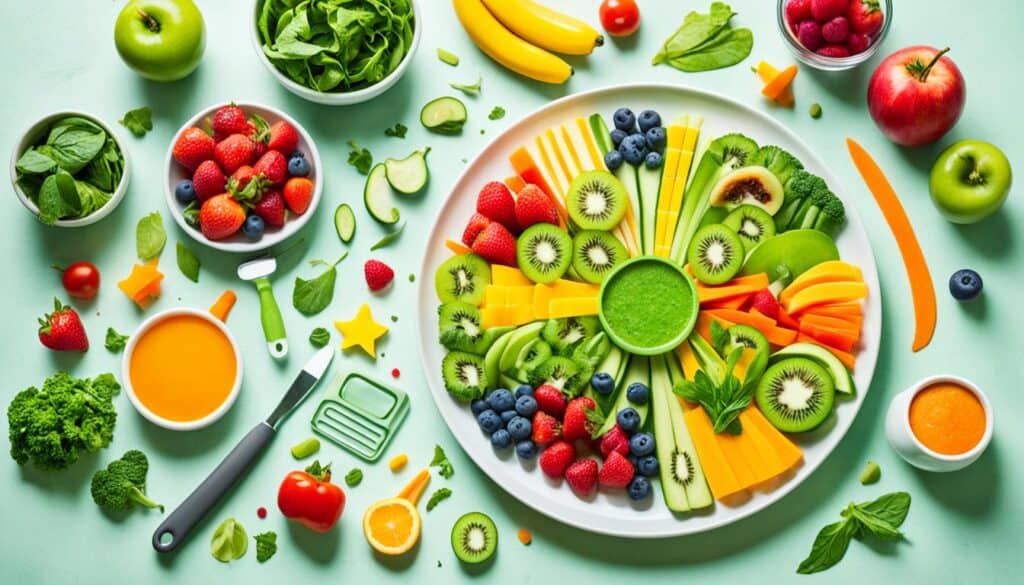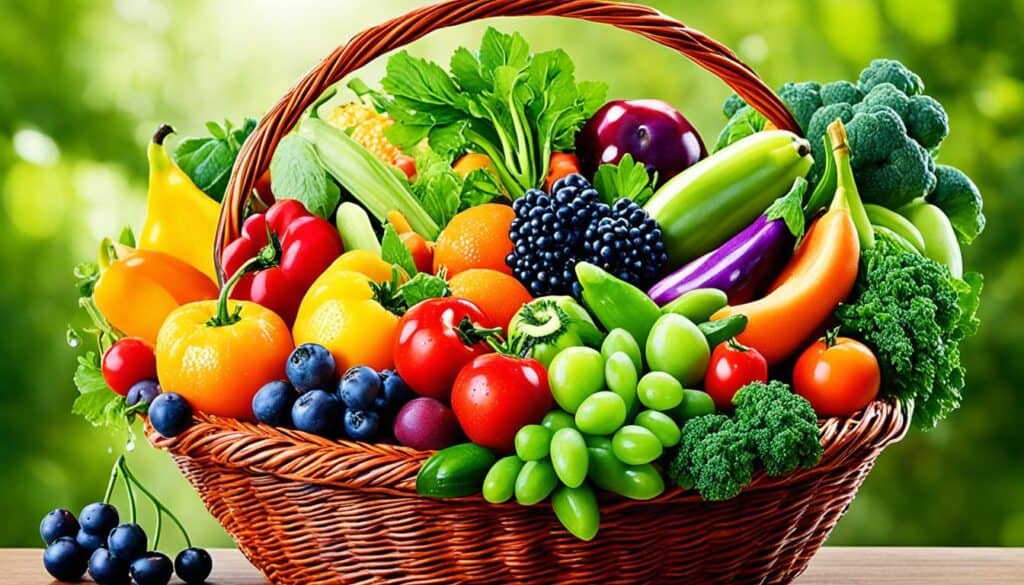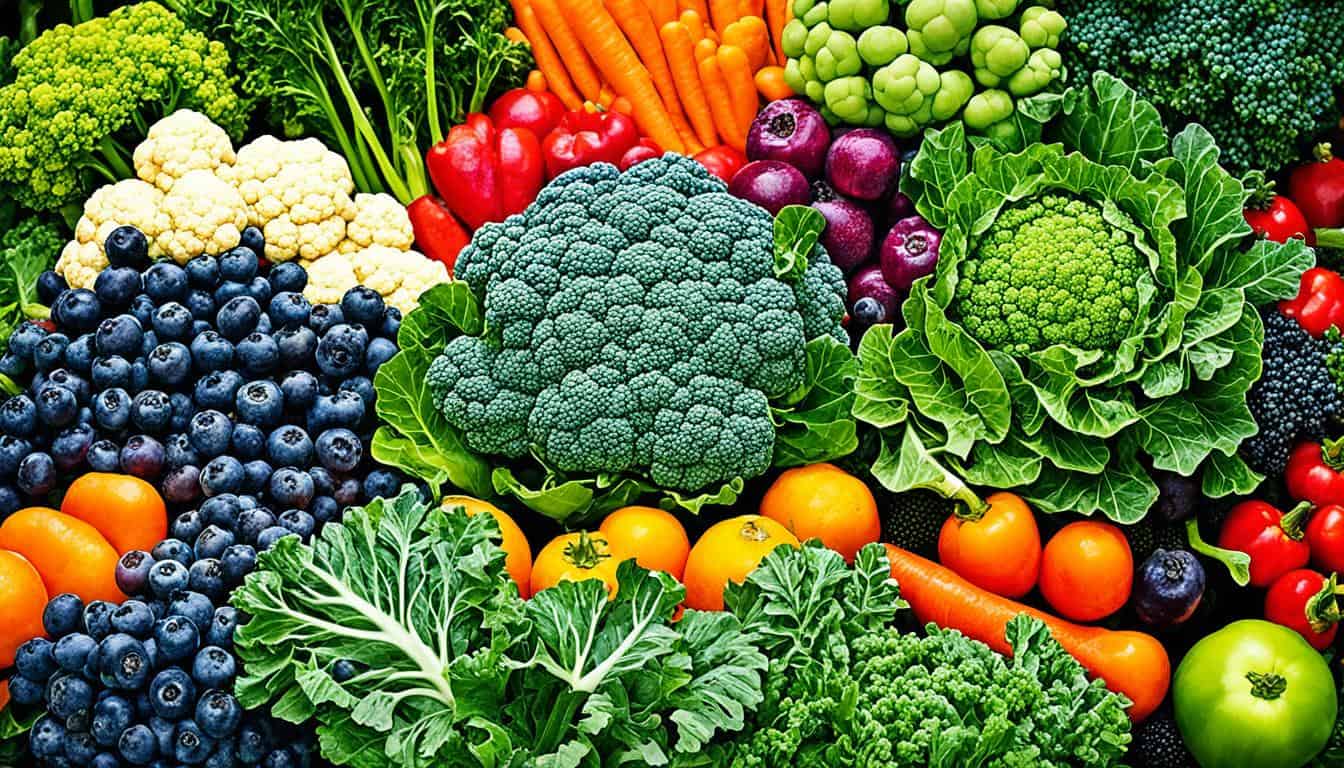Did you know that incorporating a variety of fruits and vegetables into your diet is essential for obtaining the vitamins and nutrients necessary for a healthy and nutritious lifestyle? Fruits and vegetables are not only delicious but also pack a powerful punch when it comes to providing the vital elements our bodies need.
Whether you’re looking to boost your immune system, improve your digestion, or enhance your overall well-being, fruits and vegetables offer a wide range of benefits. From vitamin-rich fruits to nutrient-packed vegetables, these natural wonders have the potential to transform your health from the inside out.
In this comprehensive guide, I will delve into the specific vitamins found in popular fruits and vegetables and explore the importance of incorporating these nutrient-rich foods into your daily diet. Get ready to unlock the secrets of these nutritional powerhouses and discover a whole new world of wellness!
Key Takeaways:
- Fruits and vegetables are packed with essential vitamins and minerals that are crucial for maintaining optimal health.
- Including a variety of fruits and vegetables in your diet can help boost your immune system, improve digestion, and enhance overall well-being.
- This guide will explore the specific vitamins found in popular fruits and vegetables and highlight the importance of incorporating them into your daily diet.
- By incorporating fruits and vegetables into your meals, you can experience the numerous health benefits these nutrient-rich foods offer.
- Stay tuned to discover how you can transform your health by harnessing the power of fruits and vegetables!
The Foundation of Health: Understanding the Basics
Fruits and vegetables are often hailed as nature’s nutritional powerhouses, and for good reason. These colorful and vibrant foods play a foundational role in maintaining optimal health and well-being. Whether you’re crunching on an apple, savoring a juicy orange, or sipping on a refreshing green smoothie, each bite and every sip provides a wealth of essential nutrients that are vital for our bodies to function properly.
So what exactly makes fruits and vegetables so special? It’s their impressive range of vitamins, minerals, and antioxidants that take center stage. These essential nutrients are key players in various bodily functions, supporting everything from growth and development to immune function and cell repair.
Unlocking the Power of Vitamins
Vitamins are organic compounds that our bodies need in small quantities to carry out essential functions. They act as cofactors, assisting enzymes in critical processes such as energy production, bone formation, and immune system regulation. Fruits and vegetables are fantastic sources of a wide array of vitamins, allowing us to meet our daily requirements naturally.
To appreciate the significance of vitamins, let’s take a closer look at some of the key players:
- Vitamin C: Found abundantly in citrus fruits, strawberries, and bell peppers, vitamin C is a potent antioxidant that supports collagen production, boosts immune function, and helps protect against cellular damage.
- Vitamin A: Carrots, sweet potatoes, and leafy greens are rich in beta-carotene, a precursor to vitamin A. This essential nutrient promotes healthy vision, supports immune function, and plays a critical role in maintaining healthy skin.
- Vitamin K: Leafy greens like kale and spinach are excellent sources of vitamin K, which is essential for blood clotting and bone health.
- Vitamin E: Nuts, seeds, and avocado are packed with vitamin E, a powerful antioxidant that protects cells from oxidative damage and supports skin health.
The Mighty Minerals
Minerals are inorganic substances that play essential roles in various bodily functions. They are involved in everything from nerve signaling to muscle contraction and maintaining proper fluid balance. Fruits and vegetables are not only a great source of vitamins but also provide an array of minerals that are crucial for overall health.
Here are some notable minerals found in these powerhouse foods:
- Potassium: Bananas, spinach, and sweet potatoes are rich in potassium, a mineral that helps regulate blood pressure, maintain proper fluid balance, and support heart health.
- Magnesium: Dark leafy greens, nuts, and seeds are excellent sources of magnesium, which is essential for nerve function, muscle contraction, and energy production.
- Calcium: While dairy products are often associated with calcium, leafy greens like broccoli and kale are also great sources of this bone-building mineral.
- Iron: Plant-based sources of iron, such as lentils, spinach, and tofu, provide the body with this essential mineral for energy production and oxygen transport.
The Power of Antioxidants
Last but not least, fruits and vegetables are loaded with antioxidants. These compounds protect our cells from harmful free radicals and oxidative stress, which can contribute to chronic diseases such as heart disease, cancer, and neurodegenerative disorders. By including a colorful array of fruits and vegetables in our diets, we can ensure a steady intake of these powerful antioxidants.
“The foundation of good health lies in a varied and balanced diet that includes an abundance of fruits and vegetables. Their rich nutritional profile, packed with vitamins, minerals, and antioxidants, forms the bedrock of our well-being.”
As we dive deeper into the world of fruits and vegetables, it becomes clear that they offer far more than just vibrant colors and delightful flavors. These nutrient powerhouses provide the essential vitamins, minerals, and antioxidants that our bodies need to thrive. By understanding the basics of these nutrients, we can unlock the full potential of fruits and vegetables and harness their benefits for our overall health and well-being.
Demystifying Superfoods: A Closer Look at Nature’s Treasures
Certain fruits and vegetables have gained recognition as “superfoods” due to their extraordinary health benefits. These nutritional powerhouses are packed with essential vitamins, minerals, and antioxidants that contribute to overall well-being and vitality. Let’s explore the science behind these foods’ super status and uncover the specific health benefits they offer.
One of the most popular superfoods is berries, such as blueberries, strawberries, and raspberries. These vibrant fruits are loaded with antioxidants, which help protect the body against oxidative stress and inflammation. Antioxidants also support healthy aging and may reduce the risk of chronic diseases.
Leafy greens like kale, spinach, and Swiss chard are another category of superfoods. They are rich in vitamins A, C, and K, as well as minerals like iron and calcium. These nutrient-packed vegetables promote heart health, boost immunity, and support proper bone function.
The Benefits of Superfoods:
- Enhanced brain function: Superfoods, such as berries, promote brain health and cognitive function due to their high levels of antioxidants and anti-inflammatory compounds.
- Improved heart health: Leafy greens are known for their heart-protective properties. They help lower blood pressure, reduce cholesterol levels, and prevent the development of cardiovascular diseases.
- Increased energy levels: The combination of vitamins, minerals, and antioxidants found in superfoods supports optimal energy production within the body, keeping you feeling energized throughout the day.
- Boosted immune system: Superfoods contain immune-boosting compounds that help fortify the body against infections and diseases, improving overall immune function.
Incorporating these superfoods into your daily diet can have a remarkable impact on your health and well-being. Whether you enjoy them in smoothies, salads, or as standalone snacks, the health benefits of superfoods are undeniable.
Practical Tips for Incorporating More Greens into Your Diet

Are you looking for practical tips to increase your fruit and vegetable intake? Look no further! Incorporating a variety of fruits and vegetables into your daily meals is easier than you think. Whether you’re a seasoned chef or a novice in the kitchen, these tips and recipes will help you make the most of these nutritious ingredients and enjoy the benefits of a diverse and flavorful diet.
1. Try Meatless Mondays
Start by designating one day of the week as “Meatless Monday.” Replace meat-based dishes with plant-based alternatives that feature an array of colorful fruits and vegetables. Not only will this help you discover new flavors, but it’s also an excellent way to reduce your carbon footprint and support sustainable eating.
2. Prepare Smoothie Bowls for Breakfast
Smoothie bowls are a fun and delicious way to start your day. Blend your favorite fruits and vegetables with a liquid of your choice (such as almond milk or coconut water) and pour the mixture into a bowl. Top it with fresh berries, granola, and a sprinkle of chia seeds for added nutrients and texture. This refreshing breakfast option is not only visually appealing but also nutrient-packed.
3. Explore International Cuisine
Expand your culinary horizons by exploring the diverse flavors of international cuisine. Recipes from around the world often incorporate a wide variety of fruits and vegetables, allowing you to experiment with new ingredients and flavors. From Thai stir-fries to Indian curries, the possibilities are endless.
4. Get Creative with Salads
Salads don’t have to be boring! Experiment with different combinations of fruits, vegetables, nuts, and seeds to create flavorful and satisfying salads. Try adding fresh berries, avocado, and grilled vegetables to your greens for added sweetness and texture. Don’t forget to experiment with homemade dressings to elevate the flavors even further.
5. Sneak Veggies into Your Favorite Dishes
If you’re not a fan of eating vegetables on their own, try sneaking them into your favorite dishes. Finely chop or grate zucchini, carrots, or spinach and add them to pasta sauces, meatloaf, or casseroles. Not only will this increase the nutritional value of your meals, but it will also add an extra depth of flavor.
6. Join a Community Supported Agriculture (CSA) Program
Consider joining a Community Supported Agriculture (CSA) program in your area. By subscribing, you’ll receive a weekly or monthly box of locally sourced, seasonal fruits and vegetables. Not only will this support local farmers, but it will also encourage you to try new produce and get creative in the kitchen.
Remember, the key to incorporating more fruits and vegetables into your diet is to make it enjoyable and sustainable. Don’t be afraid to experiment with different flavors and cooking methods, and always aim to create meals that excite your taste buds.
The Role of Fruits and Vegetables in Disease Prevention
Scientific research has shown that incorporating a variety of fruits and vegetables into your diet can significantly contribute to the prevention of various chronic diseases. These nutrient-rich foods are packed with compounds and nutrients that play a vital role in reducing the risk of illnesses such as heart disease, cancer, and diabetes.
The key to disease prevention lies in the unique combination of vitamins, minerals, antioxidants, and fibers found in fruits and vegetables. These natural compounds work together to support the body’s immune system, neutralize harmful free radicals, and promote overall health and well-being.
Let’s take a closer look at some of the specific compounds and nutrients found in fruits and vegetables that contribute to disease prevention:
Vitamin C:
Vitamin C, abundant in citrus fruits, berries, and leafy greens, is a powerful antioxidant that helps protect cells from damage caused by free radicals. Studies have shown that a regular intake of vitamin C-rich foods can reduce the risk of chronic diseases such as heart disease and certain types of cancer.
Fiber:
Fruits and vegetables are excellent sources of dietary fiber, which plays a crucial role in maintaining a healthy digestive system. A diet high in fiber has been associated with a lower risk of developing heart disease, stroke, and certain types of cancer. Fiber also helps regulate blood sugar levels and promotes healthy weight management.
Phytochemicals:
Phytochemicals are natural compounds found in fruits and vegetables that have been shown to have disease-fighting properties. For example, lycopene, found in tomatoes and watermelon, has been linked to a reduced risk of prostate cancer. Similarly, anthocyanins, found in berries, support brain health and may help prevent age-related cognitive decline.
By incorporating a wide variety of fruits and vegetables into your meals and snacks, you can ensure that you are obtaining a broad spectrum of these disease-fighting compounds and nutrients. Aim for at least five servings of fruits and vegetables per day to maximize the health benefits they provide.
| Fruits | Benefits |
|---|---|
| Blueberries | Rich in antioxidants, promote brain health |
| Oranges | High in vitamin C, boost immune system |
| Spinach | Excellent source of fiber and vitamins, support heart health |
| Broccoli | Packed with antioxidants, may help prevent cancer |
“Let food be thy medicine, and medicine be thy food.” – Hippocrates
The importance of disease prevention cannot be overstated. By including a wide array of fruits and vegetables in your daily diet, you can harness the power of nature’s medicine to support your overall health and well-being. Start reaping the benefits today and enjoy a future free from the burden of chronic conditions.
Navigating Common Misconceptions: Debunking Myths
In a world filled with dietary myths and misconceptions, it’s essential to separate fact from fiction when it comes to fruits and vegetables. Misinformation can often lead to confusion and prevent individuals from making informed decisions about their nutritional choices. This section aims to address some common misconceptions surrounding fruits and vegetables and provide accurate information to help you navigate through the falsehoods and make healthier choices for your well-being.
Myth: Fruits are high in sugar and should be avoided for weight loss.
“Fruits indeed contain natural sugars, but they also provide essential nutrients, fiber, and antioxidants. When consumed in moderation as part of a balanced diet, fruits can support weight loss goals and provide numerous health benefits.”
Myth: Vegetables lose their nutrients when cooked.
“While cooking vegetables can cause some nutrient loss, the impact is minimal. In fact, cooking can enhance the bioavailability of some nutrients, making them easier for your body to absorb. It’s important to choose cooking methods that preserve the integrity of the vegetables and avoid overcooking.”
Myth: Organic fruits and vegetables are always more nutritious than conventionally grown ones.
“While organic farming practices promote environmental sustainability, studies show that the nutrient content of organic and conventionally grown fruits and vegetables is comparable. The most important factor is incorporating a variety of fruits and vegetables into your diet, regardless of their farming methods.”
Myth: Juicing is the best way to obtain all the nutrients from fruits and vegetables.
“While juicing can provide a concentrated source of vitamins and minerals, it often removes beneficial dietary fiber. The best approach is to incorporate whole fruits and vegetables into your meals and snack on them for maximum nutritional benefits. If you do choose to juice, it’s important to consume it alongside a balanced diet.”
By debunking these common misconceptions, we can make more informed choices and appreciate the true value of fruits and vegetables in our diets. Remember, always strive for a balanced and varied approach to nutrition, and consult with a healthcare professional for personalized dietary recommendations.
A Holistic Approach to Wellness: Beyond the Plate

When we think about our health, it’s easy to focus solely on what we eat. However, a truly healthy lifestyle encompasses more than just the food on our plates. It involves nurturing our mental and emotional well-being, as well as adopting habits that promote holistic wellness.
Fruits and vegetables not only provide the essential vitamins and nutrients our bodies need, but they also have a profound impact on our mental and emotional well-being. Studies have shown that a diet rich in these wholesome foods can help reduce stress, elevate mood, and improve cognitive function.
“Let food be thy medicine and medicine be thy food.” – Hippocrates
By incorporating a variety of fruits and vegetables into our diet, we can support our overall mental and emotional wellness. From the vibrant colors and flavors they bring to our meals to the nourishment they provide our bodies, these foods have a transformative effect on our well-being.
The Mind-Body Connection
There is a strong connection between our mental and physical health. When we prioritize our physical health through nutritious and balanced meals, we inadvertently enhance our mental and emotional well-being. Fruits and vegetables play a crucial role in regulating hormones, boosting neurotransmitters, and promoting a healthy gut microbiome, all of which have a direct impact on our mood and emotions.
Furthermore, the act of preparing and savoring meals made with fresh produce can be a mindful practice that brings joy and relaxation. Engaging in the process of cooking and enjoying nutritious food can nourish not only our bodies but also our souls.
Healthy Lifestyle Habits
To truly embrace a holistic approach to wellness, it’s important to cultivate healthy lifestyle habits beyond the plate. This includes regular physical activity, adequate sleep, stress management techniques, and fostering meaningful connections with others.
Engaging in activities that bring joy and fulfillment, such as spending time in nature, practicing mindfulness or meditation, and pursuing creative hobbies, can greatly contribute to our mental and emotional well-being. By prioritizing self-care and practicing balance in all aspects of life, we can lead a healthier and more fulfilling existence.
As we strive for a healthy lifestyle, it’s crucial to remember that true well-being extends beyond the plate. While nourishing our bodies with fruits and vegetables is essential, nurturing our mental and emotional well-being and adopting healthy lifestyle habits are equally important. By taking a holistic approach to wellness, we can achieve a harmonious balance that promotes overall health and happiness.
Savor the Flavor: Exploring Delicious Recipes

Eating healthily doesn’t have to be boring or tasteless. In fact, it can be an exciting culinary adventure that tantalizes your taste buds while nourishing your body. To prove that healthy eating can be both nutritious and enjoyable, I’ve curated a collection of delicious recipes that showcase the versatility and flavor of fruits and vegetables. Get ready to embark on a flavorful journey that will make you fall in love with these nutrient-packed ingredients.
Refreshing Smoothie Delights
Kickstart your day with a burst of fruity goodness by trying these invigorating smoothie recipes:
- Tropical Paradise Smoothie: Transport yourself to a tropical island with this blend of ripe mangoes, juicy pineapples, and creamy coconut milk.
- Berrylicious Power Smoothie: Revitalize your body with a mix of antioxidant-rich berries, spinach, and a dash of almond milk.
- Citrus Sunshine Smoothie: Enjoy a refreshing citrus medley of oranges, grapefruits, and lemons, combined with Greek yogurt for a creamy twist.
Satisfying Salad Sensations
Incorporate a rainbow of flavors and textures into your meals with these mouthwatering salad recipes:
- Mediterranean Quinoa Salad: Indulge in the vibrant flavors of the Mediterranean with a salad that combines quinoa, cherry tomatoes, cucumbers, feta cheese, and a zesty lemon dressing.
- Asian Sesame Noodle Salad: Take your taste buds on an Asian-inspired adventure with this salad featuring tender noodles, crisp vegetables, and a sesame ginger dressing.
- Summer Watermelon Salad: Experience the refreshing combination of juicy watermelon, crisp cucumbers, tangy feta cheese, and fresh mint leaves – a perfect salad for hot summer days.
Mouthwatering Veggie Delights
Discover the delicious possibilities of vegetables with these flavorful recipes:
- Eggplant Parmesan: Bite into layers of perfectly baked eggplant, savory marinara sauce, and melted mozzarella cheese for a comforting and satisfying vegetarian dish.
- Roasted Brussels Sprouts with Bacon: Elevate the humble Brussels sprouts by roasting them with crispy bacon, garlic, and a touch of balsamic glaze for a delectable side dish.
- Cauliflower Fried Rice: Enjoy a healthier twist on the classic fried rice by using cauliflower rice and adding an assortment of colorful vegetables and soy sauce for flavor.
These recipes are just a taste of the endless possibilities that fruits and vegetables offer. By exploring different flavors, textures, and cooking techniques, you can create a wide variety of delicious meals that promote health and well-being. So, let your taste buds rejoice as you savor the flavor while nourishing your body with these delectable recipes!
Conclusion
Incorporating a variety of fruits and vegetables into your diet is essential for maintaining a healthy and nutritious lifestyle. These nutrient-rich foods provide a wide range of vitamins and minerals that are crucial for optimal health.
By understanding the numerous health benefits of fruits and vegetables, you can make informed choices about your daily meals. Whether you’re looking to boost your immune system, improve heart health, or support digestion, these natural powerhouses offer a myriad of benefits that can enhance your overall well-being.
Creating a nutritious diet rich in fruits and vegetables doesn’t have to be complicated. With a little creativity, you can incorporate these foods into your meals in various ways. From adding them to smoothies and salads to enjoying them as snacks or in main courses, there are endless opportunities to savor the goodness of these nature’s treasures.
To reap the long-term health benefits, it’s important to embrace a balanced and holistic approach to your lifestyle. By nourishing your body with a diverse array of fruits and vegetables, you can nourish your mind and soul too, promoting mental and emotional well-being along with your physical health.





Leave a Reply